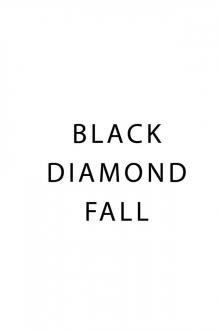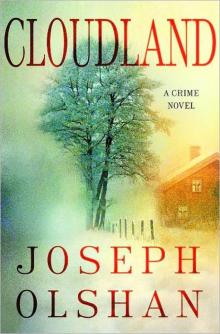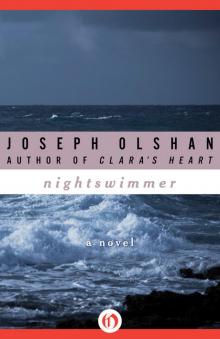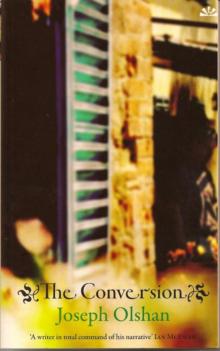- Home
- Joseph Olshan
The Conversion Page 3
The Conversion Read online
Page 3
I look out at the taupe-colored landscape of moldering stone farmhouses, gnarled olive trees, and espaliered grape vines. “Beyond the border we’ll stop for a panino,” she suggests. “You’ve eaten nothing since this morning.”
“No, grazie, non ho fame.” I find myself answering in Italian, then regretting the switch, hoping she won’t admonish me to speak English the way she did Ed.
She nods respectfully and I vaguely realize: Of course she won’t correct me. Not at a time like this. She’s knows what I’ve dealt with during the last few days in the wake of Ed’s fatal heart attack. I’ve eaten very little and have hardly slept. “May I ask you something?” Marina now says.
“D’ai,” I answer.
This triggers her to lapse into Italian. “You didn’t go back to America with the body—”
“I couldn’t afford to, knowing I had to come back for the inquest.”
“Nevertheless. I just don’t get a sense that you are in love with this man.”
Or the way Ed used to say it, “You can’t love me the way I want to be loved,” something that continues to pester me. I explain that for me, but unfortunately not for him, the relationship had been more of a friendship. And if Ed hadn’t died perhaps it might have been only a matter of months before our closeness was wrenched apart by this inequality of feeling. In light of this, Ed’s dearest friends had always treated me with caution, even contempt, as though I were some kind of literary hanger-on.
“First of all, not every relationship is sexual,” Marina observes. “And second, it’s absurd, this idea you’re a hanger-on.” She signals to change lanes. “Didn’t you tell me that besides your translations to earn your living, you’ve done some serious work?”
“Yes, that’s right.” I’d told her that I’d translated some poetry and one novel for a small press.
“I’ve also been informed that you published a novella somewhere, too,” she presses.
In a literary journal out of Oregon, I tell her, but then ask point-blank how she found this out.
“I have a friend who works in Intelligence. When I mentioned to him that I invite you to the villa, he insisted on having a look into your life—before I would bring you to my house. Let’s just say he did some digging.”
How strange, I think. I wonder why Marina would do such a thing.
“So what is this novella about, anyway?” she persists.
I briefly describe the story line, which is based on an incident in my childhood where I witnessed the drowning of a young child and, in my way, felt responsible.
Marina listens with interest and finally says, “But now, if you’ve published something such as this, you deserve to be called a writer. You are among us. Only time—and not the critics—will anoint the writer whose work will last.”
Her glance is shrewd, her eyes glacially pale. I know Marina is being earnest; she hardly seems the sort of person who’d indulge in flattery. I want to tell her that I feel as though my small succès d’estime is a fluke of nature, that the need to make a living has propelled me far away from the conviction that I have any sort of literary vocation.
Beyond this, I am hardly surprised to learn that she has her contacts in Italian Intelligence. Ed had told me that Marina’s father, an anti-fascist, had been a famous politician who’d helped craft post–World War II Italy’s constitution, that his death had been observed all over the country, and that, for a while, Marina herself had bent to the pressure of following in his footsteps and briefly served as the mayor of Genoa before returning to her childhood home in Tuscany.
And yet her manner and appearance strike me to be more Scandinavian than Italian, even down to her tasteful yet simple dress, which is neither ultra chic nor expensive. She seems to prefer tweed jackets and corduroy pants with snug twinset sweaters that are often much brighter in color than the rest of her ensemble.
Marina now asks me how I met Ed, and I explain that a mutual friend had introduced us and how, when my affair with the Frenchman ended, he’d been mysteriously waiting in the wings and had helped me through that difficult time.
“I understand now. Say no more,” Marina murmurs. She brakes the car in anticipation of the last toll station that remains before Italy begins. She pulls up to the booth, smiling at the boyish sentry patiently waiting for her payment, then realizes she hasn’t even prepared it and begins rummaging through her purse saying, “Désolée … désolée,” eliciting his smile of indulgence. Once she finds her euros, pays the toll, and we are speeding along again, she sighs and continues in Italian, “The last few days … hard to believe when you actually think about it.”
A thumbnail flash of the brutal intrusion, the faces in fury, but at what? The dull gleaming gun. And the evil sun, the long, scabrous knife, the clammy fear gripping once again. “I just wish I could … well, just take in what’s happened,” I say. “It all still seems so absurd.”
“You’re in shock,” she reminds me. “Of course you are. Now, I must confess to you how bad I feel because the last time I spoke to your friend, I made him feel his Italian was inadequate.”
“Luckily, he was a Francophile,” I find myself saying. For the first time since our journey began, we both laugh.
This bit of shared irreverence seems to dismantle the facade of strict decorum that we’ve been maintaining. The highway is crossing a divide that affords a commanding view of the Mediterranean, whose tourmaline depths, now more than a thousand feet below us, pitch and roll beneath the glaring sunlight. The heat wave plaguing Paris also afflicts the South of France; with the warm dry air blasting me in the face, I look out over the water and dream of a cooling swim.
“I do remember that your friend worked very hard at being charming,” Marina remarks at last.
“He didn’t think his charm worked very well on you.”
“Nonsense! I just couldn’t place him at first.”
“Apparently you had long conversations.”
“So what? Not everybody is blessed with immediate recall. I wasn’t expecting to see him. But he obviously demanded instant recognition because of his celebrity.” Hearing Ed spoken of in the past tense gives me a terrible jolt, and a buzzing, windy silence follows the remark. “I don’t know about you, Russell, but I must say I never feel completely at ease around people for whom charm and suavity are second nature. I admit that I am utterly fascinated by them, but that’s where it ends for me.”
“But charm isn’t ever second nature. It comes at great expense. Always,” I say just as I spy ahead of us a checkpoint where cars are being randomly stopped and searched by men in military fatigues. In travel between one European Union country and another, this border searching seems superfluous, a throwback to another era before the European community became economically linked. However, in light of the recent Middle East conflicts and the various terrorist bombings in Europe, the “instant checkpoint” is becoming more frequent. On certain days the Italian authorities set up random roadblocks and do unannounced inspections and searches. “What a mess!” Marina exclaims, and then suddenly pulls the car hard to the right and steers for a man wearing a splendid khaki uniform. More prepared this time, she rolls down her window, reaches deftly into her purse, and pulls out a green laminated photo I.D. The official scrutinizes it, then smiles at her flirtatiously and waves us through in a lackadaisical manner.
I wait for Marina to explain why we have been so effortlessly conducted into her country while the rest of the motorists have been detained at checkpoint. But the silence endures. So finally I ask.
“I do this drive so much that they’ve given me a badge. Not for privilege, but rather to just make it simpler when they do these checkpoints. Only because I often go to France on government business.”
I ask what sort and she says, “A cultural emissary of sorts. I am often invited. The French like the fact that I was once a politician.” As though to avoid further discussion of her ambassadorial role, she tells me, “Now, this is the part of the drive, from
Ventimiglia to Tuscany, that I detest. Because of people like him.” She gestures at the rearview mirror. I turn around to find that an aggressive motorist has driven up to what seems to be only a few feet of the rear of Marina’s car, insistently flashing his lights. This is typical behavior of drivers who streak along in the left lane and muscle slower motorists to the right. But Marina is already in the right lane, so there’s nowhere she can go. “My God, this is madness! What do you want?” she demands. “Does he want me to drive off the road?” she asks me.
The car finally pulls up alongside us. The long-haired driver peers at us through reflective sunglasses and then races ahead. Out of my window, a sign for Ventimiglia proves that hundreds of kilometers behind us is the city of Paris, where I’ve just spent a year and a half, and hundreds of kilometers ahead of us in Tuscany is Marina’s famous residence, which is called the Villa Guidi.
Crossing into Liguria, we follow a series of high overpasses and tunnels carved into the mountainside. “You don’t have so many tunnels in America,” Marina remarks to me. “They cost a fortune. That’s why our motorways charge such high tolls.” We descend along the coast, passing Genoa and La Spezia and the Gulf of Venus, where Shelley’s boat went down on the way from Livorno to Lerici. As I begin to think about untimely deaths, I wish that Ed had woken up before his heart attack, that he’d said something to me, given me a few words, however trivial, to hold on to. The last thing he told me before the sedative took hold and induced him to sleep was, “I feel funny, Russell.”
We finally turn inland right before the beach town of Viareggio, where Puccini spent his last days, and soon are heading in the direction of Florence. Partway to that Tuscan city, we quit the autostrada and only moments later arrive at a pair of tall iron gates. A long driveway lined with linden trees leads to an enormous villa with ocher-colored walls, a terra-cotta hip roof, and surrounding hedgerows of oleander and hydrangea. “At last!” Marina exclaims, and exits the car to be hysterically greeted by a pack of six dogs.
“Russell was absolutely fine until Italy. Now he sleeps all the time.”
“Doesn’t that make sense?” asks a man. “Think about it. Held at gunpoint, wakes up to find his lover dead of a heart attack.”
“Wasn’t a lover. Really more of a friend.”
“Oh, come on, Marina, you know what I’m saying.”
“I’m merely explaining the facts to you.”
“You’ve made them quite clear. Nevertheless—”
“If he doesn’t get up tomorrow like a normal person, I’m going to yank him out of bed and make him walk with me.”
Their voices fade as their conversation migrates to another part of the villa. Who could this other person be?
What is this fatigue that has endured for these last ten days? I’ve been sleeping in eighteen-hour increments, my sleep fevered with nightmare. The scenes are mostly Parisian, late-night excursions through a city of dark splendor in which I am on my way to collect Ed’s ashes from a crematorium. And as I try to find my way through a warren of streets, I’m carrying a burden of depression, the yoke of a man who has always been single and solitary, célibataire, as the French say. In these dreams I feel so dejected by the death of my friend that I thrash and flail and often wake up with my head at the foot of my bed.
Now it’s late at night and a throaty chanteuse is singing American hit songs from the seventies and eighties: “You are the sunshine of my life”; “I want to make it with you.” I smell attar of roses and deep spice. Once again, there seem to be intruders in my room, and I cry out.
“Ma è una camera privata (But this is a bedroom),” a woman exclaims to her companion, who says, “Ah, scusi, Signore. Non lo sapevamo (We didn’t know).”
“Didn’t you see the do-not-disturb sign on my bedroom door?” I shout at them.
“We were looking for a place to make love,” the man admits candidly.
These straggling guests have ventured where they don’t belong. On the way here from France, Marina explained that although there were many grander villas in Tuscany, Villa Guidi’s common rooms are extraordinarily large, which makes it prized for weddings and corporate functions. She rents it out and conducts a bustling business. During my stay there already have been two large and raucous affairs. Lying there, listening to the din of voices and the cover tunes, the revelry in full swing, I somehow manage to fall asleep again.
And awaken, but now to the sounds of a chain saw. I’ve cycled back into daylight, but it’s hard to know precisely what time it is. The villa is hunkered down for siesta, and my wooden shutters, opened by the housekeeper very early in the morning, are closed once again around noon to ward off the late-summer heat. I’ve been staring up at the high coffered ceiling of carved circles and hexagons and now get out of bed and throw open the shuttered window. The sky is an untarnished azure, the lawns stretching toward the tall stone walls surrounding the property are freshly mown, and Marina’s young, angelic-looking Polish groundskeeper is hacking away at the limbs of a fallen tree. There is a smell of freshly sawed wood and burning fires. Intent on staying awake, I keep the shutters open and instinctively move to the densely packed bookshelves lining an entire wall. I find literature in five languages including poetry, biographies and political texts. I notice the short novels of Mario Soldati and my favorite Italian novel of all time, La Coscienza di Zeno, by Italo Svevo. Then I discover an entire shelf filled with editions of the Bibliothèque de la Pléiade.
Pléiade books are printed by the great French publisher, Gallimard, leather-bound volumes decorated with gold leaf, onion-thin pages that I consider to be the most beautiful mass-produced books in the world. The volumes are dedicated to the “stars” of world literature, showcasing in the splendor of high production values a renowned author’s greatest works. Owning a library full of Pléiade editions is something that I’ve always dreamed of, despite the fact that my French still lags substantially behind my Italian. Michel had quite the collection.
I tentatively approach the sacred volumes. I crack a few, setting off flares of dust and a delicious crunching of leather spines and parchment: a sort of literary chiropractic. Here are some of my favorite authors: Musil, Voltaire, Lautréamont, Baudelaire, Rousseau, Sartre, Proust, and even Faulkner and Sinclair Lewis. The Pléiade is proof, I tell myself, that when the author dies, his words continue a life of their own. I used to dream of literary life after death for myself until I learned that it was possible that one’s work could be completely ignored; then I began to say to myself, “What does it matter, anyway?”
But of course things mattered greatly when it came to the literary legacy of somebody like Edward. I remember how, shortly after the police came and took his body away, I went to the folder that contained the last sequence of poems he’d been working on, many of which I had typed for him. With shaking hands, I rifled through the printed pages, as precious as sheets of gold, reading about the watery reflection of Venice seen from the window of his room in the Palazzo Barbaro.
Among the Pléiade in the bookshelf I notice a very broad, very old book on European judicial theory. And then it suddenly occurs to me: I have a court date in Paris.
In a panic, I throw my clothes on, scrub my teeth, and rush out into an enormous dining room with a gray-and-white marble floor. Staring at me are two huge portraits done in oil: a man in nineteenth-century military regalia with a diagonal sash across his chest, and a woman decked out in a ball gown ruffling with tulle. At the end of the room are a suite of six pairs of French doors, and just beyond them I spot Marina sitting outside on a loggia half as long as a football field. Showing a lot of leg in a short floral skirt, she is holding a glass of white wine and chatting with another woman, more or less the same age, dressed in tennis whites. I rush toward them barefoot, and Marina no sooner says, “Oh my God, look. The ghost has arisen?” than my abrupt arrival triggers the pack of her six dogs lying at her feet. A single bark trips off a yapping chorus and soon I am surrounded by howling, hack
led mongrels of various sizes. “Basta,” says Marina in a low throaty voice. “Zitti! Tutti.” The dogs continue barking compulsively and she then begins to question them like children, asking them whatever do they want and what they are on about.
“What day is today?” I ask.
“The twenty-fourth of August.”
“I knew it!” I cry. “I was supposed to be in Paris yesterday. I’ve missed the inquest!” The dogs, startled by my tone of voice, begin a reprise of barking backed with a lot less conviction, and this time Marina doesn’t even bother to silence them.
“All taken care of. Wait a moment. First, meet my sister-in-law. Daniela.”
“I’m sorry. How do you do?” I say in English.
“Well, and waiting for my afternoon partita,” the woman answers coquettishly.
Marina now tells Daniela in Italian that she needs to speak to me privately and suggests they begin their card game a bit later on. Daniela gives a shrug of disappointment and pushes her rhomboid-shaped sunglasses down over her eyes like a race-car driver. Showing off her English, she says, “Glad to have met you finally,” before loping across the loggia.
Once we are alone, Marina informs me that she’d consulted a physician who’d told her that my sleeping for most of the day was a symptom of shock over Ed’s sudden death and advised her that I shouldn’t travel back to Paris. “And so I had to get a Parisian friend of mine involved—a lawyer who went to court on your behalf and told them that you were not well.” She went on to say the Parisian medical examiner had come to the conclusion that Ed’s heart attack had occurred a few hours after the men broke into our room. No prosecutable link could be found between his death and their intrusion.
“So they’re not going to investigate?” I ask.

 Black Diamond Fall
Black Diamond Fall Cloudland
Cloudland Nightswimmer
Nightswimmer The Conversion
The Conversion